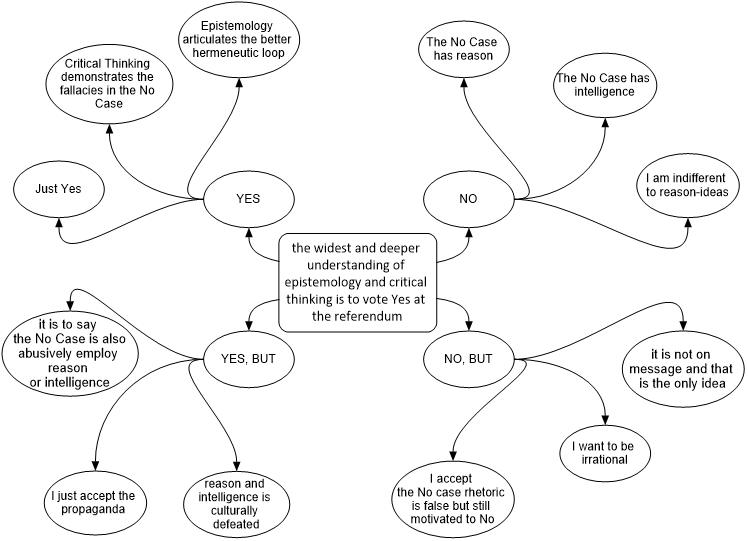Following from my previous argument that the Common Sense Philosophy, although not perfect, leads into a pathway of better intelligence, and this is the Yes referendum position as intelligence, I need to fill in some gaps for others.
A valued colleague pointed out to me that reception did not have the intended clear meaning from the blog of the terms. I started the blog by saying,
“The Common Sense Philosophy is not perfect but it can often lead into a pathway of better intelligence.” The misunderstanding becomes correct on ‘reason’ and ‘intelligence’ **as a simple tool producing one syllogism to each claim in turn, and unrelated to another**.
This is not how epistemology and critical thinking works, using the tools. As I said,
“The honest conclusion for those who dedicated their lives to the widest and deeper understanding of epistemology and critical thinking is to vote Yes at the referendum. There is no contest here.”
Furthermore, I made clear,
“Thus the motivation to dismiss the larger meta-reflective Yes argument is not to want to be intelligent and to respond to some darker force.” The use of the tools is at the level of the meta-reflection. There comes a point, in the argument tree, that the No position only can produce total-nonsense rebuttals. The political rhetoric of the No campaign is full of dismissals which do not address the question/or main conclusion.
So, let me demonstrate my point as the argument tree:
In the first and basic ‘No Case’, of “The No Case has reason” or “The No Case has intelligence”, we have a misnomer (it does not engage). The rebuttal misses the meaning of the main conclusion. “I am indifferent to reason-ideas” is a personal choice but has nothing to do with the main conclusion; also, a misnomer.
In the more complex “NO, BUT” Case, all three positions only offer each a misnomer. In fairness, we need to also look at the “YES” reasoning behind the main conclusion. My argument is both that “Epistemology articulates the better hermeneutic loop” and “Critical Thinking demonstrates the fallacies in the No Case”. I reject a third option of saying “Just Yes”. In my two arguments rebuttals are possible, and I welcome the attempts. But I foresee the rebuttals of “No” will eventually lead into the counter-defensive ‘No’ nonsense.
There is a possibility of hedging the bets on the “YES BUT” side. Two I reject. I do NOT accept the propaganda and I do not accept that, in the long run, reason and intelligence is culturally defeated; although I can accept it might be a short-term outcome. And the reason for the short-term success of the No Case, if it is to be seen after October 14, is my “YES BUT”. It is clear that the No Case is abusively employing reason or intelligences as other rhetorical sets of ideas. In short, propaganda.
I am puzzled, up to a point, why the Australian public cannot understand the rhetorical tricks and their falseness. I say, “up to a point”. I understand the effective use of propaganda. Still, it is very disappointing if the Australian public keeps falling for the basic fallacies.
Postscript: The egalitarian tradition is confused between what persons think as equal: a 100% level playing field or giving the disadvantage a leg up. My view is that we need a level playing field, but not at 100% which is impossible but maybe at a range of 50-80% (approximation) where privilege off-sets disadvantage.
Neville Buch
Latest posts by Neville Buch (see all)
- Cognition Histories and Sociology in The United States. No. 1 - November 18, 2024
- To the new Queensland Minister for Education and the Arts - November 16, 2024
- Conversations with, and Between, Queensland Elites - November 16, 2024

